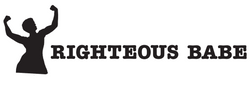About Us
Label founder Ani DiFranco once called Righteous Babe Records “a people-friendly, sub-corporate, woman-informed, queer-happy small business that puts music before rock stardom and ideology before profit,” and it’s hard to imagine a more accurate mission statement than that one.
Since Ani bucked the major label system in the early-‘90s, opting to release her music on her own terms, the self-described Little Folksinger has been the subject of all kinds of hyperbole. She’s been called “fiercely independent” (Rolling Stone), “inspirational” (All Music Guide), “the ultimate do-it-yourself songwriter” (The New York Times), etc. As the cracks in the music industry get larger and more big-name artists follow Ani’s lead – Radiohead, Madonna and Nine Inch Nails among them – maybe people will just start calling her “smart.”
As important as Righteous Babe Records is to the singer/songwriter/guitarist, she’s more than happy to trust like-minded people with the business and revel in the complete artistic freedom it provides.
Ani DiFranco has written hundreds of songs, played thousands of shows, captured the imaginations of legions of followers, and jammed with folkies, orchestras, rappers, rock and roll hall-of-famers, jazz musicians, poets, pop superstars, storytellers and a martial arts legend. She’s “fixed up a few old buildings” and minimized her carbon footprint before it was trendy – from installing a geothermal heating and cooling system in the renovated church that her label calls home to using organic inks on all the t-shirts she sells. But nothing she’s done in her 20+year career has garnered more attention than a business decision.
By the way, none of this ever appeared on any five-year plan or annual report; it has all developed out of necessity, over a long period of time fraught with trial and error and unanticipated golden opportunities. As Ani puts it, demand comes before supply around here. One reason things take so long is that we put a lot of thought into everything we do: we strive to work with local designers and manufacturers whenever possible, we insist on American-made fabrics, we carefully check out every magazine and website before we consider advertising, we mull over film offers, and we tend to stick with the same promoters from Ani’s coffeehouse days. Sometimes people don’t agree with the decisions we make, and they let us know, and we listen in a spirit of dialogue.
Over the years, we have learned that independence doesn’t always equal obscurity and that reaching people doesn’t necessitate “selling out.” You can be political, you can be autonomous, and you can pay the rent, too. The high point of any given day at RBR comes when we hear from other folks who tell us they’ve taken our example and added their own unique twist to it. Lots of times it’s other musicians starting up their own labels (Prince, for instance), but we also get word from magazine publishers, website designers, arts organizations, activists, educators, you name it. We discovered that lots of people are as frightened as we are by the prospect of a world governed by one mega-mergerized multinational corporation where income is the only measure of success, and together we are committed to finding working alternatives to that model.
Yer Pals at RBR
